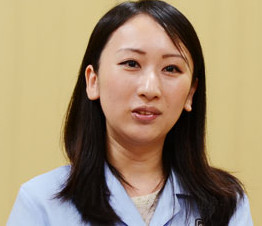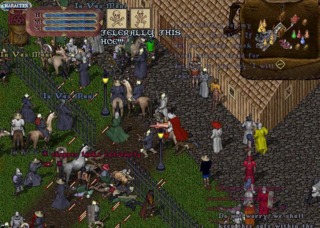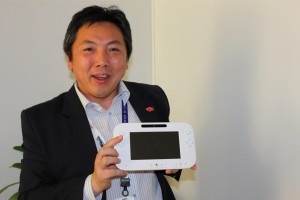When Aya Kyogoku started as a designer at Nintendo, she was the first woman employed in Nintendo’s Entertainment Analysis & Development department. Most recently, Kyogku was the project lead on Animal Crossing: New Leaf, where women made up nearly half of the development team.

Entertainment Software Analysis & Development is better known as Nintendo EAD, an internal division responsible for some of the company’s most groundbreaking games, including Mario, F-Zero, and others. It also includes Animal Crossing, a series that started development on Nintendo 64, though most of the world never played that version.
I spoke with Kyogoku at the Game Developers Conference this year, an event where she joined the producer of New Leaf, Katsuya Eguchi, on stage to talk about how diversity helped their team develop a better game. Eguchi and Kyogoku argued the wide range of experiences from team members helped make New Leaf the most successful Animal Crossing yet.
When Kyogoku joined EAD in 2003, she was the lone woman. But she didn’t give that much thought when she joined.
“I didn’t really think of myself as a female game designer, just that I’m a game designer,” said Kyogoku. “So when I entered Nintendo, I saw it as a new job with things to learn. So there was pressure I felt from that, but I never felt pressure as a female game designer.”
Given Kyogoku gave a talk heavily emphasizing how game development benefits from people of varying backgrounds, she appreciates how the culture has changed, even within Nintendo.
“When I first got involved in the industry, compared to now, there’s a lot more women,” she said. “Simply looking at the teams, I feel like ‘Wow, there’s a lot more women!’ Having people of all backgrounds and life experiences is great to have on a development team. Just looking at it makes me very happy.”
That Kyogoku ended up working on the Animal Crossing series makes sense, considering her background. Kyogoku confessed to having spent many hours exploring Ultima Online when she was a student.
“Rather than doing into dungeons and fighting monsters,” she said. “I would go into the neighboring field and go harvest some cotton or mine some ore. I would spend a lot of time doing that.”
Sounds a little bit like playing Animal Crossing, no?

Kyogoku found herself spending more and more time in Ultima Online, eventually having to give up the game.
“It was starting to affect my personal life, as well. [laughs]” she said. “As I got into game development, I realized that I can’t spend all this time playing games if I’m going to try and make games, as well. That was my graduation out of Ultima Online.”
Working at a game developer, she admitted it was pretty easy to sneak in some gaming sessions during the day, since it’s not weird to have a game console at your desk.
When Kyogoku joined Nintendo, she didn’t start on Animal Crossing. She did script design on The Legend of Zelda: Four Swords Adventures and The Legend of Zelda: Twilight Princess before becoming a sequence director on Animal Crossing: City Folk. She eventually graduated to director with New Leaf.
City Folk, however, was an interesting time for Kyogoku and the Animal Crossing team. City Folk was the most popular Animal Crossing yet, and it would have made sense to make another that followed in the footsteps of City Folk. But after reflecting on the game, the team realized the series was becoming less interesting, and wanted to tweak the formula. The team apparently received little pushback on this idea.
“As a company, I don’t think if a team wants to move in a certain direction, I don’t think the company tries to get in the way of that,” said producer Katsuya Eguchi. “This happens not only with Animal Crossing, but with any game. We always do a postmortem after a game has been released, and there’s things [where we say] 'we should do this, we should do that, we shouldn’t do this, we shouldn’t do that.' Things we need to go through as a development team. The company, as a whole, does that, as well. If the development team feels like this is the direction they would like to take it for the next installment of any game, the company really supports us in that way.”

Eguchi has been involved with Animal Crossing since the beginning, and the influences he brought to the series proved surprising. Eguchi used to love playing Diablo. (But not Diablo II, since it became too complicated.)
“I love the fact that you can collect all these things, whether it’s rings or equipment, and wear it on yourself,” he said. “Then, you go deep into a dungeon, and when you lose, you drop it! I just had so much fun asking people ‘please, can you help me go collect all my gear that I left?’ [laughs] Just the fact that you go into the game, you lose that, and then you have to ask your friends in real-life and then go back into the game with them, it kind of mirrors the concept of communication that we really wanted to emphasize in Animal Crossing. Perhaps something like that, the roots can be found in a game like Diablo.”
Communication is a key element to Animal Crossing. One can play the game alone, but it’s only part of the story. Traveling to other towns, sharing fashion creations--it's is a huge design element. To that end, it’s hardly a surprise to learn Eguchi and Kyogoku find often play multiplayer games together.
“Of the recent games I’ve played, I know it’s a different company, but I enjoyed Monster Hunter,” said Eguchi. “ With movies like Lord of the Rings, I feel like the archer is the coolest. [laughs] Me, personally, I’m more like a dwarf...”
“When I play, I’m not very good at the controls,” said Kyogoku. “I don’t use weapons like the katana or bigger broadswords, so I use a smaller sword. Once I read in a magazine that there was going to be a collaboration and you could get Link’s bow and arrow! That’s when I converted to an archer. [laughs]
“I really think playing together with friends is a big element,” said Eguchi. “In order to play with friends, you have to be at a similar level. Because of that, you tend to play a little bit more by yourself to reach that level, so you’re not left behind by your friends. At the same time, just getting together, whether it’s local or wireless or over the Internet, really drives me to play a lot more. It’s a similar way in Animal Crossing: New Leaf.”
"In 20 [or] 30 years, when the users in that time are playing, I would like to say 'when mom and dad were young, we were playing Animal Crossing, too!'"
If a Nintendo game is successful, chances are there will be another entry. Though Nintendo has not announced another Animal Crossing, I’ll shave my head if there’s not another one in a few years on another Nintendo platform. It’s not hard to imagine Animal Crossing will continue for many, many years to come, and Kyogoku and Eguchi have given thought to such a legacy.
“It’s hard to say what Animal Crossing is going to look like in 10 years,” said Kyogoku, “but I do hope it’s still around and it’s reached out to an even wider range of audience. At the same time, I really hope it stays as franchise that’s both enjoyable to newcomers and people who’ve enjoyed the franchise for all this time.”
“In 20 [or] 30 years, when the users in that time are playing, I would like to say “when mom and dad were young, we were playing Animal Crossing, too!”” said Eguchi. “It would be great if we could say something like that. It might actually turn out that I’m more of a grandpa or grandma, but even then, it’d be great to say 'back in my day, we used to play like this!'"